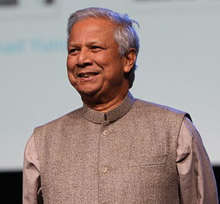Muhammad Yunus, the inventor of microcredit
Source: https://www.babyloan.org/en/muhammad-yunus-the-inventor-of-microcredit#
Born in Bangladesh in 1946, Muhammad Yunus is the inventor of microcredit as we know it today.
Muhammad Yunus and the origins of microcredit
 Building on existing concepts, Professor Yunus’ work constituted a genuine economic and social breakthrough, earning him a nomination for the Nobel Prize in Economics in 2005 and receipt of the Nobel Peace Prize in 2006.
Building on existing concepts, Professor Yunus’ work constituted a genuine economic and social breakthrough, earning him a nomination for the Nobel Prize in Economics in 2005 and receipt of the Nobel Peace Prize in 2006.
Nicknamed “the banker to the poor”, economics scholar Muhammad Yunus founded the Grameen Bank (literally the “village bank”) in 1977, in order to fight against poverty and to facilitate access to capital among disadvantaged sections of Bangladesh’s population.
Since then, Muhammad Yunus’ model has been replicated throughout the world, allowing the poorest people to benefit from small amounts of credit that give them the opportunity to develop a profit-making business.
“By granting credit to those who have never been able to borrow, the immense unexploited potential within all human beings is revealed.
It enables creativity, not by forcing these people to adopt new methods or new beliefs, but by giving them the possibility to make their own dreams come true.”
Microfinance and social business
Numerous businesses are committed alongside Muhammad Yunus to promoting socially responsible finance, with a significant social impact.
In this way, Babyloan aligns itself with the social business model created by Muhammad Yunus and is committed to pursue the path of socially responsible financing alongside him, notably through its partnership with the Fondation Grameen-Crédit Agricole, which acquired an equity stake in Babyloan in 2010 and is now an integral part of our field partner Selection Committee and of our Strategy Committee.
As an aside, Muhammad Yunus wrote the preface for the book Recettes Solidaires, published by the Bocuse d’Or Winners Academy, which will be released at the end of 2014. This recipe book outlines the commitment of an organisation of chefs to the micro-entrepreneurs who they support.
Muhammad Yunus and the Grameen Bank
Created in 1976 in Bangladesh, the Grameen Bank uses microcredit to fight against poverty. By creating a banking system based on trust and creativity, Muhammad Yunus breathed new life into traditional banking mechanisms.
The Grameen Bank specialises in microcredit, and today works in more than 50,000 villages. Out of the billions of dollars lent, Muhammad Yunus’ “bank to the poor” registers repayment rates of around 99%, indicative of how seriously it takes the process of selecting projects.
The Grameen Bank is also unique in that it is 94%-owned by micro-entrepreneurs, the majority of whom are women, with the Bangladeshi government owning only the remaining 6%. This reinforces its social credibility and guarantees its independence.
